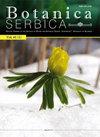塞尔维亚桔梗挥发油的化学成分、抑菌性和抗自由基性
IF 1.1
4区 生物学
Q4 PLANT SCIENCES
引用次数: 1
摘要
芳香植物和精油在医药、制药、化妆品和食品工业中有许多应用。对水蒸馏法提取的桔梗地上开花部位挥发油进行了成分分析,并对其抑菌和自由基清除活性进行了研究。其主要特征是含氧单萜(72.7%),其中以1,8-桉树脑(29.2%)和樟脑(23.4%)含量最多。倍半萜含量较少(4.8%)。对8株ATCC菌株和2株白色念珠菌ATCC菌株进行抑菌活性试验。该精油对黄体微球菌的MIC值为3.50 μ g/mL,对金黄色葡萄球菌、表皮葡萄球菌和枯草芽孢杆菌的MIC值<100 μ g/mL。革兰氏阴性菌大肠杆菌和铜绿假单胞菌耐药。桔梗精油对2,2-二苯基-1-苦酰肼(DPPH)自由基的抑制活性呈浓度依赖性,SC50值为5.4 mg/mL。TLC-DPPH分析显示两个主要的淡黄色斑点,表明具有抗dpph活性的成分,经分离鉴定为1,8-桉叶脑和樟脑。本文章由计算机程序翻译,如有差异,请以英文原文为准。
The chemical composition, antimicrobial and antiradical properties of the essential oil of Achillea grandifolia aerial parts from Serbia
Aromatic plants and essential oils have many applications in medicine, pharmaceuticals, cosmetics, and the food industry. The essential oil of the flowering aerial parts of Achillea grandifolia, obtained by hydrodistillation, was analyzed for its constituents and investigated for antimicrobial and radical scavenging activity. The essential oil was characterized by a high amount of oxygenated monoterpenes (72.7%) with 1,8-cineole (29.2%) and camphor (23.4%) being the most abundant. Sesquiterpenes were present in smaller quantities (4.8%). Antimicrobial activity was tested against eight ATCC bacterial strains and two ATCC strains of Candida albicans. The essential oil exhibited highly pronounced antimicrobial activity against Micrococcus luteus with a MIC value of 3.50 ?g/mL, as well as significant antimicrobial activity (<100 ?g/mL) against Staphylococcus aureus, S. epidermidis and Bacillus subtilis. Gram-negative bacteria Escherichia coli and Pseudomonas aeruginosa were resistant. Achillea grandifolia essential oil exhibited concentration-dependent antiradical activity against 2,2-diphenyl-1-picrylhydrazyl (DPPH) radical with an SC50 value of 5.4 mg/mL. The TLC-DPPH assay revealed two main light yellow spots indicating components with anti-DPPH activity, which after isolation were identified as 1,8-cineole and camphor.
求助全文
通过发布文献求助,成功后即可免费获取论文全文。
去求助
来源期刊

Botanica Serbica
Agricultural and Biological Sciences-Plant Science
CiteScore
1.40
自引率
12.50%
发文量
17
审稿时长
34 weeks
期刊介绍:
Botanica Serbica publishes original research papers on all aspects of plant, fungal and microbial biology research including the disciplines of microbiology, mycology, lichenology, bryology, flora, vegetation, biogeography, systematics, taxonomy, plant biotechnology, plant cell biology, plant ecology, environmental plant biology, forestry, genomics, horticulture, limnology, metabolomics, molecular biology, proteomics, virology, plant conservation and protection, and wildlife and ecosystem management.
 求助内容:
求助内容: 应助结果提醒方式:
应助结果提醒方式:


